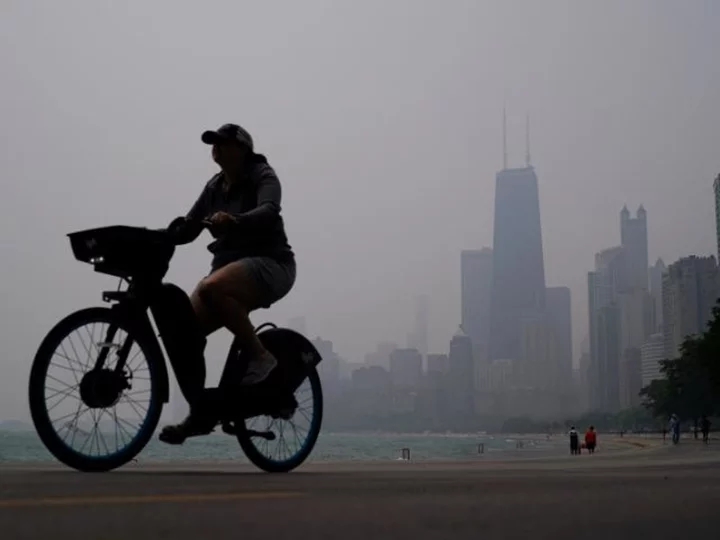Over 80 million people from the Midwest to the East Coast are under air quality alerts as smoke from the Canadian wildfires sweep across the US border Tuesday, prompting beach closures, warnings about reduced visibility and calls to stay indoors.
Canada is seeing its worst fire season on record with hundreds of wildfires raging across the country -- more than 200 of them burning "out of control," according to the Canadian Interagency Forest Fire Centre. The wildfires have led to the highest emissions on record for the country, according to a Tuesday report from Copernicus.
As smoke crosses into the US, air quality alerts have been issued for the entire states of Iowa, Wisconsin, Illinois, Indiana, Michigan, Delaware and Maryland as well are portions of Kansas, Missouri, Minnesota, Ohio, Pennsylvania, New York and Virginia, according to the National Weather Service. Residents are being advised to stay indoors with their air conditioning running or wear N95 masks if they have to be outside.
Chicago had the worst air quality in the world Tuesday evening, according to IQAir. The city's Air Quality Index measured at 193 -- a high reading designated as "unhealthy."
The city has asked all residents -- especially those with heart or lung disease, older adults, pregnant people and young children -- to avoid outdoor activities and protect themselves from exposure.
Chicago Public Schools and camps are also moving activities indoors, city officials said in a news release.
About 11 miles away, Evanston, Illinois, is closing all swimming beaches and canceling a concert Tuesday due to the poor air quality, the city said on Facebook, asking residents to limit outdoor exposure through Wednesday.
Across the state line in Michigan, the Mackinac Bridge stood covered with smoke Tuesday. Drivers were asked to drive slow and with caution due to the reduced visibility on the bridge.
Detroit, Michigan, had the second worst air quality in the world Tuesday evening, with an "unhealthy" Air Quality Index is at 174, according to IQAir.
High levels of fine particulate in the air in Michigan could become unhealthy or hazardous for all residents at some points -- not just sensitive groups, the state's health department warned.
"The most protective option when air is unhealthy for you is to stay indoors with air conditioning, reduce strenuous activities and limit outdoor activities. If you have to be outside, N95 masks offer enhanced protection when used according to product instructions," the Michigan Department of Health and Human Services said.
Indianapolis drivers were also warned about reduced visibility, with the National Weather Service saying to "be prepared for haze that could suddenly reduce visibilities" in some areas Tuesday and Wednesday.
New York is also expected to see unhealthy levels of smoke return Wednesday and Thursday to some areas -- about three weeks after New York City topped the list of the world's worst air pollution as smoke from the Canadian wildfires wafted south, turning skies orange.
"New Yorkers should be prepared for elevated levels of fine particulate pollution caused by smoke on Wednesday and Thursday," Gov. Kathy Hochul said in a statement. "Current projections show the highest concentrations of smoke will slowly push east across the eastern half of New York State during the day Thursday, extending across much of the state."
In Ohio, a spokesperson for the Cleveland's mayor's office said "what happened in NY a few weeks ago and Chicago today may happen here in Cleveland tomorrow."
The Northeast Ohio Areawide Coordinating Agency issued an air quality advisory, forecasting fine particulate levels in the "Unhealthy" Air Quality Index range.
Wildfire smoke carries particulate matter, or PM2.5 -- a tiny but dangerous pollutant that, when inhaled, can travel deep into lung tissue and enter the bloodstream, according to the Centers for Disease Control and Prevention. The particulate matter has been linked to a number of health problems including asthma, heart disease and other respiratory illnesses.

